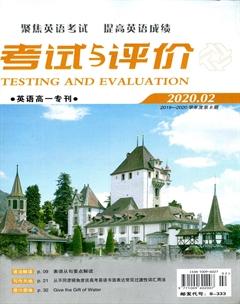How to End Bullying?
董云姣
不久前,火爆荧屏的大戏《少年的你》引发了大众的热议,校园霸凌的话题再度成为我们关注的焦点。你也许见到过或者正在经历着校园霸凌,你也许觉得那是遥不可及的电影故事。但不管怎样,该如何保护“少年的你”是我们需要了解的。
Perhaps you've watched the recent movie Better Days, which focuses on1 bullying(霸凌) at school. It has raised heated public discussion about how to deal with bullying. In fact, the government is taking measures to solve this problem, as it has become increasingly serious.
On Oct 26, the Standing Committee of the National People's Congress reviewed a draft revision (修订草案) to the law on the protection of minors (未成年人) for the first time, China Daily reported. The draft includes a number of new and improved provisions (条例) to strengthen2 the protection of minors.
One focus is bullying. A survey of primary and middle school students showed that more than 32 percent of students have experienced bullying at school, Global Times reported.
The draft asks schools to set up mechanisms (机制) to prevent bullying and to report any bullying incidents to parents. They are also being asked to work with the government when handling such incidents.
The draft also includes a new chapter-Internet Protection. It aims to protect children when they're online. For instance, it says that places that provide Internet services for minors, such as schools and libraries, should have protective software on their computers.
It also asks online game suppliers (供应商) to sort through their products and take technical measures to keep minors away from games that are not suitable for them.
The draft revision has been widely welcomed. As the law on the protection of minors was revised (修订) in 2006 last time, it was found to have difficulties solving certain problems that are more common today.
“The draft revision is a timely response3 to society's needs,” Zhang Jie, a researcher at the Communication University of China, told Xinhua.
【词海拾贝】
1. focus on v. 聚焦;以……为焦点2. strengthen v. 加强;巩固 3. response n. 回复;回应
【难句解析】
1. It has raised heated public discussion about how to deal with bullying.
释义:它引起了公众对怎么处理霸凌热烈的讨论。
点拨:疑问词what, which, who, when, where, how及连接副词whether与不定式连用,形成一个短语,这个短语相当于一个名词,可在句中作句子的主语、宾语或表语等。例如:
What to do is not decided yet.
2. They are also being asked to work with the government when handling such incidents.
釋义:处理这样类似事件的时候,学校也正在被要求与政府一起合作。
点拨:when后可以接现在分词一般式作状语,表示原因、方式、伴随、结果或条件等,此时它的逻辑主语应与句子的主语保持一致,现在分词短语表示的动作与其逻辑主语是主谓关系,且与谓语表示的动作同时发生。when后接过去分词作状语,过去分词短语表示的动作与其逻辑主语是动宾关系。例如:
When watching TV, I fell asleep.
When offered help, one often says “Thank you.”
3. It also asks online game suppliers (供应商) to sort through their products and take technical measures to keep minors away from games that are not suitable for them.
釋义:它也要求网络游戏供应商对他们的产品进行分类,并且采取技术措施,保护青少年远离那些不适合他们的游戏。
点拨:that引导定语从句,修饰先行词games。在定语从句中,关系代词或关系副词都代替先行词在从句中充当一定的成分,如果这个从句中缺少主语、表语、宾语或定语,就要用关系代词;如果从句中缺少状语,就需要用关系副词来连接。例如:
I have never forgotten the days when we stayed together.
I have never forgotten the days that we spent together.
I. Choose the right answer.
1. Which is NOT true?
A. On Oct. 26, the law on the protection of minors was set up for the first time.
B. The school and the government work together to deal with bullying.
C. Online game suppliers are asked to take measures to keep minors away from improper games.
D. It is necessary to revise the law on the protection of minors today.
2. What is the author's attitude towards stopping bullying?
A. Supportive. B. Indifferent. C. Negative. D. Passive.
3. What is the purpose of Internet protection?
A. To sort through their products.
B. To protect children when they surf the Internet.
C. To keep minors away from games.
D. To stop minors from entering net bars.
4. What is the passage mainly about?
A. We should protect minors.
B. Bullying does harm to minors.
C. Bullying happens at school.
D. The government takes measures to deal with bullying.
II. Fill in the blanks.
1. Some schools ____ ____ (采取措施) to solve the bullying at school.
2. I ____ ____ (有困难) in communicating with my new roommates at the beginning of the term.
3. The colorful dress ____ ____ ____ (适合) you.
4. The activity ____ ____ (目的是) enrich the school life.
5. Jason is ____ ____ (不仅仅) a lecturer; he is a writer, too.

